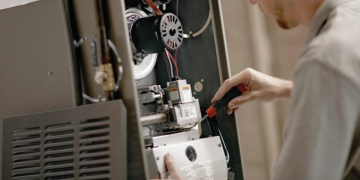Last Updated on April 13, 2022 by AlexJames
I’ve said this often, and I’ll say it again:
Computer repair – like all electronics repair – is a lot like brain surgery.
Sure, it follows a predictable pattern of execution.
But even with the most proactive approaches, it entails risk.
The sort of danger that follows from the limits of human agency. Instances where the tech’s fingers and tools can’t reach the site of the problem. Periods when even the choicest computer repair shop software proves without value.
Episodes that call on the specialized worker to innovate solutions. Uphold a certain risk-taking temperament. The kind of disposition that is providential. Something not learnable – at least not imitable like the real thing.
Observations from Experience – Rendering Risks Unavoidable
I’ve found that risks during advanced repair sessions are unavoidable. Because situations turn up that demand out-of-the-box thinking. And the courage to follow through.
This recourse – more often than not – yields success.
The risks, though, are not only centred on the devices undergoing repairs. They can also arise in the sphere of human health. Or even – in our concern here – with computer repair shop software use.
Both, unfortunately, are enough to wreak havoc on a salvage gig.
The repair tech, then, needs to be solid on these added fronts. Any weakling behaviour here can pose a service quality threat.
Let’s open each of these issues further.
The Health Hazards of Repair
Now health, of course, is not only physical. It also encompasses the psychological domain. So a worker – every human being, rather – needs to be well on both counts. Otherwise, some aspects of performance can suffer.
Focusing on the Apparent
Physical wellbeing is a function of such things as:
- Good, optimized nutrition
- Proper, time-bound, exercise
- Adequate sleep
- Mind, body, and soul contentment
You would’ve noticed I’ve added the ‘psyche point’ to the list. The inclusion is intentional. Because the mind-body connection is overarching and influential. Both aspects of the equation are inseparable. Their effects don’t show well in isolated analyses.
Repair targets all facets of the worker’s physical integrity. Bad diets – a staple of the average tech – beget a range of illnesses. When coupled with little or no motion, they become poisonous.
Little sleep – pathologized with insomnia – causes brain retardation. Body-wide inflammation also occurs as a near consequence.
If these issues remain unaddressed, broken devices alone wouldn’t be the problem. The human agent him-/herself would need repairs.
The Psychological Shortfall
There are two types of mental distress that can bog the repair worker.
One has to do with the longstanding concern of underlying behavioural issues. The kind of baggage that the worker comes to the station with. These handicaps are disabling. And while they do allow the worker to excel in some quarters, the net effect is not good.
Sometimes, the psychological fixation can lead to overwork. This causes severe work/life imbalances. A vicious cycle that feeds into the work routine – later resulting in its downfall.
The risk here comes from the worker sinking into their obligations too deep. Forgetting other important life affairs as an expense of their work schedules.
Industrial peer pressure also plays a role in the picture.
There is this stereotype in the field of the good repair tech being a consummate workaholic.
Many aspiring techs fall victim to this mentality. They try to blare their ‘expertise’ on the back of it. And at the start, they do reap some hard work benefits. But it isn’t long before this orientation turns debilitating. Morphed into a habit that eats into all concerns for productivity.
For my part, I also blame computer repair shop software for this regress. It’s hard not to – not when all the popular interfaces come with ‘stoke prompts’. Messages and notifications that urge the worker to try harder – vest more effort. Framing the matter as a chase where securing the bottom line always remains elusive.
The worker’s well-being is secondary. It only becomes an issue if the profits (vis-a-vis net productivity) take a downturn.
Bad Habits: Reinforced by Culture
The ‘stereotypes’ argument, when probed deeper, arises from the travesty of culture. A sociological plane where rabid individualism is king. Showcased, to an unhealthy degree, by working eagerness. A competence marked by the ‘always on’ disposition.
Changing culture, as every new-age life survivor knows, is not easy. Doing so, by default, is contingent on popular resentment. Something I don’t see happening anytime soon.
What all this boils down to is another font of risk inherent to the repair trade. The ambitious tech, then, who also wants to maintain their health, needs to be wary. Cautious – unless the reflex towards toxicity takes hold.
Above, I’ve alluded to a negative result of professional repair shop software use. The same notifications feature lamented, in fact, can usher good use!
I’m talking about custom messages designed to keep the worker’s habits in check. Soft reminders to breathe every once in a while. Steer clear of the risk of adopting the ‘typical tech’ position.
This strategy is a failsafe backed by my personal experience. It’s kept my sanity in check during difficult periods. Times when the allure of overwork was great – and resistant to other tactics.
The Importance of Knowing What You’re Getting Into
The takeaway from this narration is simple:
Field aspirants, irrespective of other factors, should know what they’re getting into.
It’s no fun – an understatement – to dip your toes into a pond that’s not favourable. The ‘work’ and ‘agent’ natures, as it were, need to match.
An overt reliance on repair management software is also a mistake. The only thing that the industrious tech can rely on is their own metal. Outside implements only ever muddy the water.
If you’d like to vent your own take on this issue, please reach out through the comments below.
Know that I don’t bite 😊.
In fact, I welcome approaches that give me pause for learning!



































































